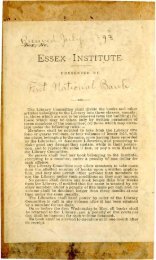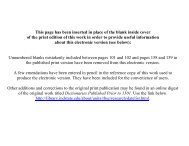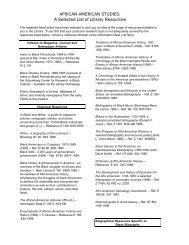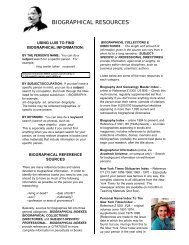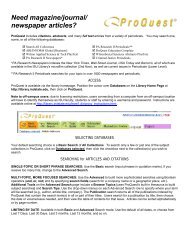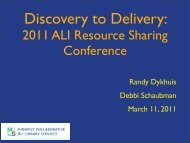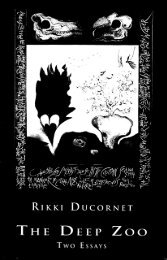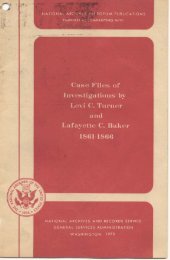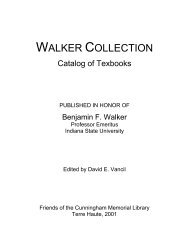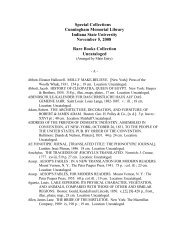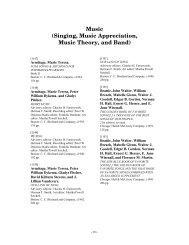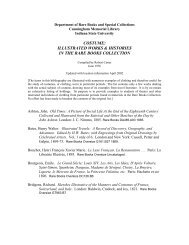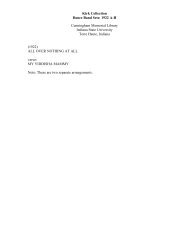PDF - Cunningham Memorial Library
PDF - Cunningham Memorial Library
PDF - Cunningham Memorial Library
You also want an ePaper? Increase the reach of your titles
YUMPU automatically turns print PDFs into web optimized ePapers that Google loves.
Graduated Series qf English R~adin.fJ·L~ssoll Books.<br />
i<br />
i<br />
I<br />
, '<br />
at ansIYering the practieal purposes of n Class·Book of later English<br />
Literature.<br />
As the titte imports, a leading feature of the Graduated Series is<br />
the graduation of the difficulty of tho lessous. This feature clnrac·<br />
tcrises, indcl'd, in n greater or less deg-rec, nll school reading..1.>ooks<br />
which have any pretensions to the name. llut: the novelty of tlIe<br />
present project is, that it seeks to carry out the idea of gradun tian<br />
morc thoroughly, and to base it on a lUorc philosophical foundation<br />
than exi5tin~ works of the same kind have attempted to do. It has<br />
hitherto been the practice to graduate reading-lessons, almost exclusively,<br />
either accordin~ to the complexity of the grammatical con·<br />
structions, or according to the tlifficulty of- the words which occur in<br />
them. This practice has resulted from a too limiteU view of what<br />
the term reading should imply. A lesson cannot be said to be pro·<br />
perly 'read unless it is fully compl"ehcndecl; and it olJViously by no<br />
means follows that n lesson is easy of comprehension because it CX~<br />
hibits n scarcity of unusual words and constructions. .A. sentence<br />
which may be ulleredand grammaticnlly analysed witb great faeilitr,<br />
may present a very hard problem to the intellect. This is a conside~<br />
ration of the utmost consequence. In graduating the lessons of the<br />
present series, the Edrtor has had reference, not only to their verbal<br />
and ~rammaticalpeculiarities, but also to the general calibre of mind<br />
requisite to untlerstand and appreciate the ideas which they express.<br />
As to the subject-mntter he has beeuguided by no nrbitrary staudard,<br />
hut by n wish to pl'ese~ttojuvenile readers that kind of iutellectual<br />
food which experience has declared to lJe suitable for the various stages<br />
ofgrowth to which the volumes separately address themselves.<br />
nIost of the present reading.lessons either consist of plain campen·<br />
dious outlines of some of the departments of art and the branclles of<br />
natural science, or they abound in abstract essays and rhetorical or<br />
poetical common.placcs. 'Yith reference to the former, the distinction<br />
between general information and special instruCtion in matters<br />
of fact, which is of a purely didnctic nature, has not hitherto beeu<br />
stendily kept iu view. It hns been too ofteu forgotten that the earn·<br />
munication of this sort of knowledge, howe,'er useful it rna}" be, is<br />
secondary in importance"to the cultivation ofa taste for reading, and<br />
to the training of the pmver and the habit of independent thinking<br />
and obsel','ation. But it is beginning to be recognised, that one of<br />
the most infallible ways of creating a distaste for inquiry into the<br />
construction and phenomena of the material unh~erse, is to burden<br />
the mind with a mass of technieal facts; that such facts nre not ne.<br />
London: LONGMAN, GREEN, and CO. Paternoster Row.



